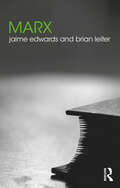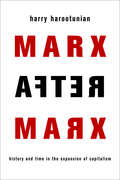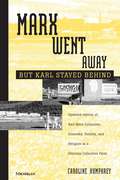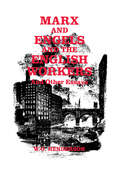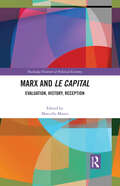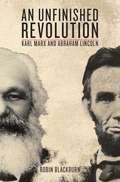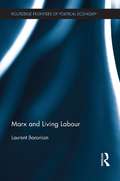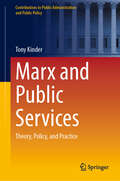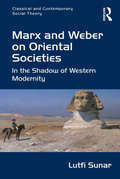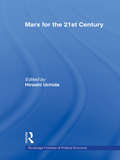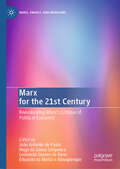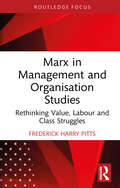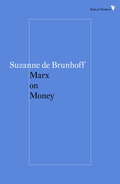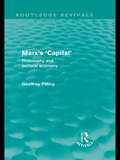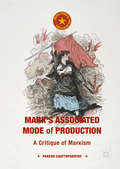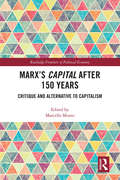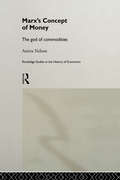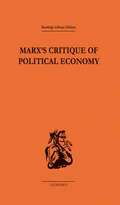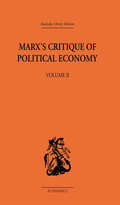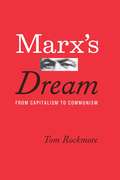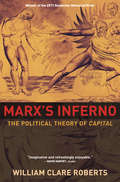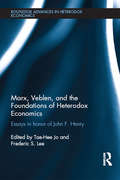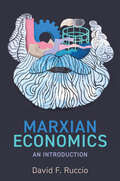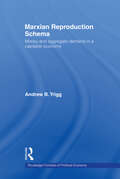- Table View
- List View
Marvin: A Personalized Telehealth Approach to Mental Health
by Regina E. HerzlingerMore than one third of Americans were said to suffer some type of behavioral health ailment at some point in their lifetime, with many people requiring chronic therapy or intervention. Despite significant clinical needs, access to reliable treatment has been difficult due to shortage of providers, stigma, and poor reimbursement. Marvin's primary offering was online teletherapy via video chat. They hoped to bring Marvin's solution to a wider audience and thought that the race belonged to the swift. As they considered the market opportunity and the complex landscape of digital mental health, they wondered what to do?
Marx (The Routledge Philosophers)
by Brian Leiter Jaime EdwardsThe writings of Karl Marx (1818–1883) have left an indelible mark not only on the understanding of economics and political thought but on the lives of millions of people who lived in regimes that claimed (wrongly) his influence. Trained as a philosopher and steeped in the thought of Hegel, Marx turned away from Hegelian philosophy after 1845 towards a philosophy that incorporated economics and history. It is this Marx that endures and to which this outstanding introduction is devoted.Jaime Edwards and Brian Leiter begin with an overview of Marx's life and intellectual development, including his early years as a journalist in Germany before his exile in London. They then introduce and assess the fundamental elements of Marx’s thought: Marx’s theory of history and historical change (historical materialism) class conflict, the state, and the Communist revolution Marx’s theory of economics, especially the labour theory of value, and his prediction of the collapse of capitalism the nature and role of ideology in Marx’s thought Marx’s theory of human nature and the good life, including his arguments concerning alienation Marx’s legacy and influence, including Western Marxism, the Frankfurt School, and “feminist Marxism”. Including annotated further reading suggestions at the end of each chapter and a glossary of technical terms, this is an indispensable introduction to Marx's philosophical thought. It will also be extremely useful to those in related disciplines such as politics, sociology, history, and political economy.
Marx After Marx: History and Time in the Expansion of Capitalism
by Harry HarootunianIn Marx After Marx, Harry Harootunian questions the claims of Western Marxism and its presumption of the final completion of capitalism. If this shift in Marxism reflected the recognition that the expected revolutions were not forthcoming in the years before World War II, its Cold War afterlife helped to both unify the West in its struggle with the Soviet Union and bolster the belief that capitalism remained dominant in the contest over progress. This book deprovincializes Marx and the West's cultural turn by returning to the theorist's earlier explanations of capital's origins and development, which followed a trajectory beyond Euro-America to Asia, Africa, and Latin America. Marx's expansive view shows how local circumstances, time, and culture intervened to reshape capital's system of production in these regions. His outline of a diversified global capitalism was much more robust than was his sketch of the English experience in Capital and helps explain the disparate routes that evolved during the twentieth century. Engaging with the texts of Lenin, Luxemburg, Gramsci, and other pivotal theorists, Harootunian strips contemporary Marxism of its cultural preoccupation by reasserting the deep relevance of history.
Marx Went Away - But Karl Stayed Behind: Economy, Society and Religion in a Siberian Collective Farm
by Caroline HumphreyWhen it appeared in 1983, Caroline Humphrey's Karl Marx Collective was the first detailed study of the Soviet collective farm system. Through careful ethnographic work on two collective farms operated in Buryat communities in Siberia, the author presented an absorbing--if dispiriting--account of the actual functioning of a planned economy at the local level. Now this classic work is back in print in a revised edition that adds new material from the author's most recent research in the former Soviet Union. In two new chapters she documents what has happened to the two farms in the collapsing Russian economy. She finds that collective farms are still the dominant agricultural forms, not out of nostalgic sentiment or loyalty to the Soviet ideal, but from economic and political necessity. Today the collectives are based on households and small groups coming together out of choice. There have been important resurgences in "traditional" thinking about kinship, genealogy, shamanism and mountain cults; and yet all of this is newly formed by its attempt to deal with post-Soviet realities.
Marx and Engels and the English Workers: And Other Essays
by W. O. HendersonPublished in the year 1989, Marx and Engels and the English Workers is a valuable contribution to the field of Economics.
Marx and Le Capital: Evaluation, History, Reception (Routledge Frontiers of Political Economy)
by Marcello MustoOver the past few years, Marx’s Capital has received renewed academic and popular attention. This volume is dedicated to the history of the making, the theoretical evaluation, and the analysis of the dissemination and reception of an almost unknown version of Capital: the French translation, published between 1872 and 1875, to which Marx participated directly. In revising this version, Marx decided to introduce some additions and modifications, not hesitating to describe in the postscript Le Capital as ‘a scientific value independent of the original’. To mark the 150th anniversary of the French translation of Capital (1872-2022), 15 authors have helped to shed light on its history and main features, as well as analysing its later fortunes in France and in the rest of the world. They also provide a more exhaustive account of the ideas of the "late" Marx. The book also includes a previously unpublished selection of 31 letters from correspondence of Karl Marx, Maurice Lachâtre, Just Vernouillet and Friedrich Engels related to the making of Le Capital. 10 of these letters by Marx were only recently rediscovered and are translated here for the first time in English. This book is an indispensable source for academic communities who are increasingly interested in rediscovering Marx beyond 20th century Marxism. Moreover, it will be of appeal to graduate students, as well as established scholars, interested in French socialism and the history of the labour movement.
Marx and Lincoln: An Unfinished Revolution
by Abraham Lincoln Karl Marx Robin BlackburnKarl Marx and Abraham Lincoln exchanged letters at the end of the Civil War. Although they were divided by far more than the Atlantic Ocean, they agreed on the cause of free labor and the urgent need to end slavery. In his introduction, Robin Blackburn argues that Lincoln's response signaled the importance of the German American community and the role of the international communists in opposing European recognition of the Confederacy. The ideals of communism, voiced through the International Working Men's Association, attracted many thousands of supporters throughout the US, and helped spread the demand for an eight-hour day. Blackburn shows how the IWA in America--born out of the Civil War--sought to radicalize Lincoln's unfinished revolution and to advance the rights of labor, uniting black and white, men and women, native and foreign-born. The International contributed to a profound critique of the capitalist robber barons who enriched themselves during and after the war, and it inspired an extraordinary series of strikes and class struggles in the postwar decades. In addition to a range of key texts and letters by both Lincoln and Marx, this book includes articles from the radical New York-based journal Woodhull and Claflin's Weekly, an extract from Thomas Fortune's classic work on racism Black and White, Frederick Engels on the progress of US labor in the 1880s, and Lucy Parson's speech at the founding of the Industrial Workers of the World.
Marx and Living Labour: Marx And Living Labour (Routledge Frontiers of Political Economy)
by Laurent BaronianFrom his early economic works on, Marx conceived the labour of any kind of society as a set of production activities and analysed the historical modes of production as specific ways of distributing and exchanging these activities. Political economy on the contrary considers the labour only under the form of its product, and the exchange of products as commodities as the unique form of social labour exchange. For Marx, insofar as the labour creating value represents a specific mode of exchanging the society's living labour, general and abstract labour cannot not only be defined as the substance or measure unit of the commodity, as in Smith or Ricardo, but foremost as an expense of living labour, i.e. of nerves, muscles, brain, etc. Hence the twofold nature of living labour, as a concrete activity producing a use value and an expense of human labour in general producing exchange value. Marx himself claimed that this twofold nature of labour creating value was its main and most important contribution to economic science. This book aims at showing how both determines the original categories and economic laws in Capital and constitutes the profound innerspring of Marx's critique of political economy. The role and function of living labour is highlighted by dealing with the difference between Marx and Classics' theories of labour value; money and the problems of its integration in economic analysis, especially in Keynes; the transition from feudalism to capitalism; the theory of capital through a discussion on the Cambridge controversy and the transformation problem; the labour process and the principles of labour management; unemployment and overpopulation; the formulas of capital in the history of economic thought; finally, an interpretation of the current crisis based on Marx's conception of overaccumulation and speculation after having distinguished it from underconsumption and stagnation theories of crises.
Marx and Public Services: Theory, Policy, and Practice (Contributions to Public Administration and Public Policy)
by Tony KinderBy evaluating previous public management research through Marxist concepts, this textbook offers innovative solutions to public service problems. It updates Marx’s framework to reflect the growth of public services, transitioning from abstract state notions to concrete service analysis. Addressing two critical gaps, the book highlights the benefits of a Marxist approach to public services and presents Marxist ideas to examine these services at a micro level. It demonstrates the relevance of Marxist frameworks for public service professionals, critically reviews current public management knowledge, and sheds light on the dynamic nature of public services against the background of neoliberalism. While doing so, the book goes beyond a Eurocentric perspective, providing cases and practical examples from developed and developing countries, with an additional focus on Asian practices. Written by an award-winning author with years of practical experience and designed for graduate and advanced undergraduate students, each chapter sets clear learning objectives and reviews existing tools and frameworks. The chapters also present new ways of improving public services, encouraging readers to apply Marxist concepts to their contexts and cultures. This will also make this book a practical resource for practitioners and professionals, seeking to resolve their grounded public services issues.
Marx and Weber on Oriental Societies: In the Shadow of Western Modernity (Classical and Contemporary Social Theory)
by Lutfi SunarThe Orient was central to the work of Marx and Weber, both figures building their theories around the question of why modernity appeared to emerge only in the West. While Marx’s account focused on the accumulation of capital in the West, Weber’s explanation for this phenomenon centred on Western rationalization. Extending recent work comparing the social theories of Marx and Weber, this book examines their approaches to Oriental societies, showing how, in spite of the differences in their respective theorizations of the historical and political development of the West, their work on the form of modern society in the Orient converges, each complementing the other. Fully conversant with recent scholarly work on Marx and Weber, this comprehensive re-examination of the points of convergence and departure in their work requires us to re-evaluate both their positions in the history of sociology and their relevance to contemporary social questions. As such, it will appeal to scholars of social and political theory and classical sociology.
Marx for the 21st Century (Routledge Frontiers of Political Economy #Vol. 73)
by Hiroshi UchidaThis groundbreaking collection surveys current research on Marx and Marxism from a variety of perspectives. Setting forward an unconventional range of questions for discussion, the book develops key ideas, such as the theory of history, controversies about justice and the latest textual scholarship on The German Ideology. Written by Japanese scholars, the volume affords western readers a glimpse for the first time, of the results of many years’ debates and discussion. Following the long tradition of Japanese interest in Marx, the book draws on the relationship between that and radical changes in local political context, as well as the economic and political development represented by Japan. Over the course of the chapters, Marx is rescued from ‘orientalism’, evaluated as a socialist thinker, revisited as a theorist of capitalist development and heralded as a necessary corrective to modern economics. Of particular interest are the major scholarly revisions to the ‘standard’ historical accounts of Marx’s work on the Communist Manifesto, his relationship to the contemporary theories of Louis Blanc and P.J. Proudhon, and new information about how he and Engels worked together. This landmark work opens up a world of Japanese critical engagement and lively scholarship that will appeal to anyone interested in Marx and Marxism.
Marx for the 21st Century: Reevaluating Marx's Critique of Political Economy (Marx, Engels, and Marxisms)
by João Antonio de Paula Hugo da Gama Cerqueira Leonardo Gomes de Deus Eduardo da Motta e AlbuquerqueThis book offers a critical assessment of some of the most contentious topics in the Marxian critique of political economy in the light of the recent publications of the complete manuscripts and editions of Capital in MEGA. Covering issues like the incompleteness of Marx&’s critique of political economy, the long-term trajectories of capitalism, the problem of economic crisis, and the center-periphery dynamics within global capitalism, this book offers an original intervention into the current debates of the Marxist tradition precisely at a crucial moment for the research of Marx&’s critique of the capitalist economy, and recovers the true critical, dialectical and open character of Marx&’s social theory.
Marx in Management and Organisation Studies: Rethinking Value, Labour and Class Struggles (Routledge Focus on Business and Management)
by Frederick Harry PittsThis book introduces new approaches that deploy concepts from Marx’s critique of political economy to renew the study of labour, value and social antagonisms in the broad area of management and organisation studies. Exploring established and emergent strands of Marxian theorising inside and outside management and organisation studies, it delves into, beyond and behind the ‘hidden abode’ of production to examine a range of issues including: the relationship between the workplace and the market; the relationship between conflicts at work and wider social and political movements; the role of class, gender and race in capitalist society; and the interconnection of work and labour with the environmental crisis. The book will be of interest for academics, postgraduate students and researchers interested in radical perspectives on work, organisation and economic life. Representing both a critical introduction to existing theories and a theoretical contribution to the development of the field of study in its own right, it condenses challenging ideas into a short, readable volume without losing their complexity or sophistication.
Marx on Money
by Suzanne De BrunhoffThe republication of Suzanne de Brunhoff's classic investigation into Karl Marx's conception of "the money commodity" shines light on commodities and their fetishism. The investigation of money as the crystallization of value in its material sense is central to how we understand capitalism and how it can be abolished. Marx on Money is an elegant analysis of how money, credit, debt and value fit into the "logic of capital" that characterizes commodity society.From the Trade Paperback edition.
Marx's 'Capital': Philosophy and Political Economy (Routledge Revivals)
by Geoffrey PillingMarx’s Capital has of course been widely read; this revival of a systematic study by Geoffrey Pilling, originally published in 1980, argues powerfully that, in order to understand Capital fully, it is necessary to have read and understood Hegel’s Logic. This argument leads to a detailed examination of the opening chapters of Capital, and a re-examination of their significance for the work as a whole. Pilling emphasizes the fundamental nature of the break between Marx’s Capital and all forms of classical political economy, and stresses the revolutionary nature of Marx’s critique of political economy as one of the foundations of Capital. He also lays particular emphasis on the philosophical aspects of the work, so often neglected by British commentators, and puts forward the view that Marx’s notion of fetishism, often looked upon as incidental to his work, is in fact central to his entire critique of political economy.
Marx's Associated Mode of Production: A Critique of Marxism (Marx, Engels, and Marxisms)
by Paresh ChattopadhyayThis book aims to restore Marx’s original emancipatory idea of socialism, conceived as an association of free individuals centered on working people’s self- emancipation after the demise of capitalism. Marxist scholar Paresh Chattopadhyay argues that, Marx’s (and Engels’s) ideas have been deliberately warped with misinterpretation not only by those who resent these ideas but more consequentially by those who have come to power under the banner of Marx, calling themselves communists. This book challenges those who have inaccurately revised Marx’s ideas justify their own pursuit of political power.
Marx's Capital after 150 Years: Critique and Alternative to Capitalism (Routledge Frontiers of Political Economy)
by Marcello MustoFaced with a new crisis of capitalism, many scholars are now looking back to the author whose ideas were too hastily dismissed after the fall of the Berlin Wall. During the last decade, Marx’s Capital has received renewed academic and popular attention. It has been reprinted in new editions throughout the world and the contemporary relevance of its pages is being discussed again. Today, Marx’s analyses are arguably resonating even more strongly than they did in his own time and Capital continues to provide an effective framework to understand the nature of capitalism and its transformations. This volume includes the proceedings of the biggest international conference held in the world to celebrate the 150th anniversary of Capital’s publication. The book is divided into three parts: I) "Capitalism, Past and Present"; II) "Extending the Critique of Capital"; III) "The Politics of Capital". It contains the contributions of globally renowned scholars from 13 countries and multiple academic disciplines who offer diverse perspectives, and critical insights into the principal contradictions of contemporary capitalism while pointing to alternative economic and social models. Together, they reconsider the most influential historical debates on Capital and provide new interpretations of Marx’s magnum opus in light of themes rarely associated with Capital, such as gender, ecology, and non-European societies. The book is an indispensable source for academic communities who are increasingly interested in rediscovering Marx beyond 20th century Marxism. Moreover, it will be of great appeal to students, as well as established scholars interested in critique of capitalism and socialist theory.
Marx's Concept of Money (Routledge Studies in the History of Economics)
by Anitra NelsonThis work relates Marx's theory of money to his overall political economy, and places it firmly within the wider context of his political and philosophical thought. It has for some time been held that there exists an epistomological break between the early 'humanist' and later 'scientific' Marx. However, in this ground-breaking study Anitra Nelson links Marx's conecept of money to his early key concepts with particular reference to 'alienation'.
Marx's Critique of Political Economy Volume One: Intellectual Sources and Evolution
by Allen OakleyVolume One analyses the intellectual sources and evolution of Marx's critique of political economy leading up the writing of the main Capital manuscripts (1844-1860).The volume:* Provides a clear illustration of the contents of the texts in a way that enables readers to understand the intellectual influences on Marx* Clarifies Marx's own view of what he was trying to achieve through his critique of political economy* The themes of value, income distribution and the law of motion of capitalism are traced to their origins.
Marx's Critique of Political Economy Volume Two: Intellectual Sources and Evolution
by Allen OakleyVolume Two covers the years 1861-1863, when Marx consolidated and refined the arguments of his critique of political economy in his relatively neglected manuscripts Theories of Surplus Value. * Special attention is paid to the nature, scope and limitations of Marx's critique and to the critique of Ricardo's Principles.
Marx's Dream: From Capitalism to Communism
by Tom RockmoreTwo centuries after his birth, Karl Marx is read almost solely through the lens of Marxism, his works examined for how they fit into the doctrine that was developed from them after his death. With Marx’s Dream, Tom Rockmore offers a much-needed alternative view, distinguishing rigorously between Marx and Marxism. Rockmore breaks with the Marxist view of Marx in three key ways. First, he shows that the concern with the relation of theory to practice—reflected in Marx’s famous claim that philosophers only interpret the world, while the point is to change it—arose as early as Socrates, and has been central to philosophy in its best moments. Second, he seeks to free Marx from his unsolicited Marxist embrace in order to consider his theory on its own merits. And, crucially, Rockmore relies on the normal standards of philosophical debate, without the special pleading to which Marxist accounts too often resort. Marx’s failures as a thinker, Rockmore shows, lie less in his diagnosis of industrial capitalism’s problems than in the suggested remedies, which are often unsound. ? Only a philosopher of Rockmore’s stature could tackle a project this substantial, and the results are remarkable: a fresh Marx, unencumbered by doctrine and full of insights that remain salient today.
Marx's Inferno: The Political Theory of Capital
by William Clare RobertsMarx’s Inferno reconstructs the major arguments of Karl Marx’s Capital and inaugurates a completely new reading of a seminal classic. Rather than simply a critique of classical political economy, William Roberts argues that Capital was primarily a careful engagement with the motives and aims of the workers’ movement. Understood in this light, Capital emerges as a profound work of political theory. Placing Marx against the background of nineteenth-century socialism, Roberts shows how Capital was ingeniously modeled on Dante’s Inferno, and how Marx, playing the role of Virgil for the proletariat, introduced partisans of workers’ emancipation to the secret depths of the modern “social Hell.” In this manner, Marx revised republican ideas of freedom in response to the rise of capitalism.Combining research on Marx’s interlocutors, textual scholarship, and forays into recent debates, Roberts traces the continuities linking Marx’s theory of capitalism to the tradition of republican political thought. He immerses the reader in socialist debates about the nature of commerce, the experience of labor, the power of bosses and managers, and the possibilities of political organization. Roberts rescues those debates from the past, and shows how they speak to ever-renewed concerns about political life in today’s world.
Marx, Veblen, and the Foundations of Heterodox Economics: Essays in Honor of John F. Henry (Routledge Advances in Heterodox Economics)
by Tae-Hee Jo Frederic LeeJohn F. Henry is an eminent economist who has made important contributions to heterodox economics drawing on Adam Smith, Karl Marx, Thorstein Veblen, and John Maynard Keynes. His historical approach offers radical insights into the evolution of ideas (ideologies and theories) giving rise to and/or induced by the changes in capitalist society. Essays collected in this festschrift not only evaluate John Henry’s contributions in connection to Marx’s and Veblen’s theories, but also apply them to the socio-economic issues in the 21st century. In Part I leading heterodox economists in the traditions of Marxism, Post Keynesianism, and Institutionalism critically examine Marx’s and Veblen’s theoretical frameworks (and their connections to each other) that have become the foundations of heterodox economics. Chapters in Part II showcase alternative theoretical explanations inspired by Marx, Veblen, and Henry. Topics in this Part include financial crisis, financialization, capital accumulation, economics teaching, and the historical relationship between money and class society. Part III is devoted to John Henry’s heterodox economics encapsulated in his "farewell" lecture, interview, and bibliography. Essays in this book, individually and collectively, make an important point that the history of economic thought (or historical analysis of economic theory and policy) is an integral part of developing heterodox economics as an alternative theoretical framework. Anyone who is troubled by the recurring failure of capitalism as well as mainstream economics will find this book well worth reading.
Marxian Economics: An Introduction
by David F. RuccioMore and more people have turned to Marxian economics in recent years. But isn&’t it a defunct branch of the &‘dismal science&’, disproven by the experience of the past 150 years, of no interest to anyone except historians? In this book, David Ruccio demonstrates why the answer to that question is a resounding &‘no&’. He offers a clear and accessible introduction to the basic concepts and theoretical strategies of Marxian economics, its key differences from mainstream economics, and its many applications to the real world. Focusing on Marx&’s critique of both mainstream economic theory and capitalism, Ruccio extends that analysis to contemporary topics—from inequality and economic crises to racial capitalism and the climate crisis—and outlines the key debates among Marxian economists. He concludes with a discussion of the ways Marxian economists today think about the possibility of moving beyond capitalism. The book is suitable for students and professors, as well as readers outside the academy interested in learning about Marxian economics. It will be useful both as a stand-alone text and as a companion to reading Capital.
Marxian Reproduction Schema: Money and Aggregate Demand in a Capitalist Economy (Routledge Frontiers of Political Economy)
by Andrew TriggIn 1878 Karl Marx developed the reproduction schema: his model of how total capital is produced and reproduced. This is thought to be the first two-sector economic model ever constructed. Two key aspects of Marx’s writings are widely agreed to be undeveloped: The role of aggregate demand and the role of money. This book synthesizes various strands of economic thought to enable the reader to understand and clarify the structure of the reproduction schema. This synthesis will challenge prevailing orthodoxies. This book constructs a macro monetary model which draws on a wide range of economic theories, within both the Marxian economic tradition, and the tradition of Keynes, Kalecki, Domar, Sraffa and Leontief. Marxian economics has been dominated by supply-side thinking, including general equilibrium theory and pronouncements about the shortage of surplus value, whilst Post Keynesians have failed to take seriously the importance of reproduction and the multisectoral structure of capitalism. By locating aggregate demand and the circuit of money in the reproduction schema, this key book provides an analytical contribution to both Marxian and Post Keynesian economics.

